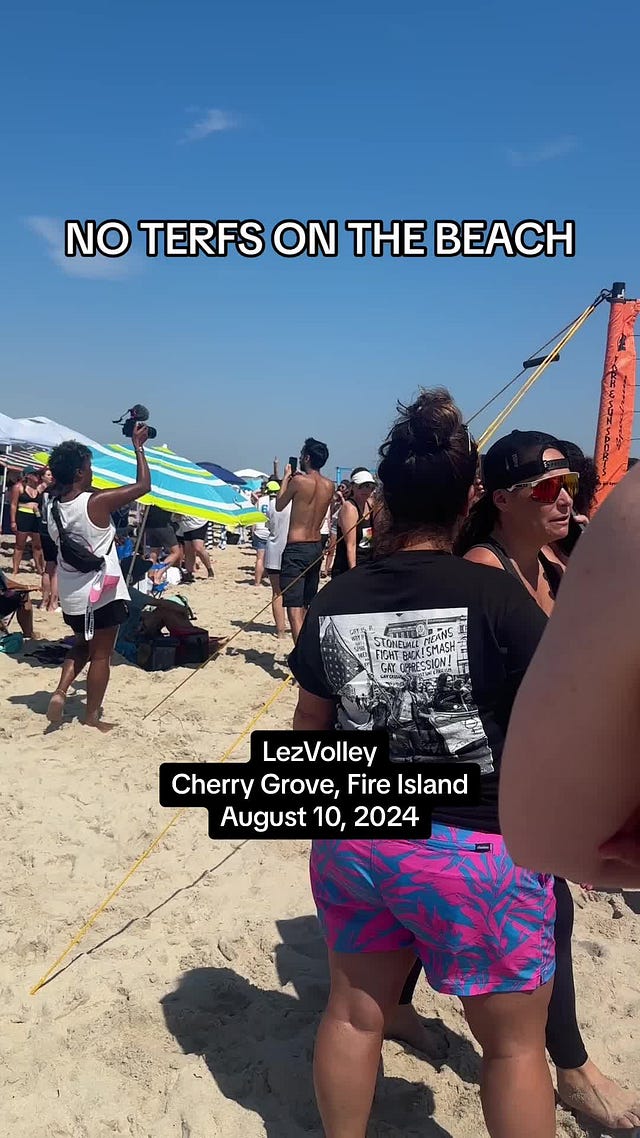LezVolley Grapples with Inclusivity Questions Following Transgender Participation Controversy
A Closer Look at the Controversy, Highlights from the Town Hall, and an Exclusive Interview with the Player at the Center of It All
Lesbian group chats have been lit up with speculation over the future of LezVolley, a beloved tentpole summer event that takes place on the queer playground of Fire Island, just fifty miles from New York City.
LezVolley is the annual women’s volleyball tournament held on the beach in the Fire Island hamlet of Cherry Grove. Founded in 2011 by two lesbian nightlife promoters, the event has grown tremendously over the past thirteen years. It draws hundreds, if not thousands, of people to Cherry Grove on the second Saturday in August each year, creating an unofficial party weekend that many people begin planning for nearly six months ahead because accommodations in Cherry Grove are so limited.
In 2023, I spoke fondly of LezVolley in my GLAAD-nominated docu-podcast series “Finding Fire Island”, where I documented the history, mystique, and lore of Cherry Grove and The Pines. In the series’ second episode, a community member refers to LezVolley as a “high holiday” because it’s the “only day all year in which the entire beach is filled with lesbians.” While Fire Island is typically associated with gay men (in The Pines), it is queer women who have been holding Cherry Grove as sacred since they began owning homes there in the late eighties and early nineties. So, what happens when that sacred space holds its “high holiday for lesbians,” and a trans man is called out for participating? Well, a shitshow.
The conflict at LezVolley has sparked intense debate in Cherry Grove, raising complex questions about inclusivity, identity, and the future of queer spaces. As the controversy unfolds, it challenges long-standing traditions while highlighting evolving understandings of gender and sexuality.
This article examines the conflict from multiple angles, drawing on eyewitness accounts, community responses, and an exclusive interview with Cameron Nicholson, the trans man at the center of the controversy. It also provides insight into the recent Town Hall meeting where community members and organizers grappled with LezVolley's future.
How a Volleyball Game Sparked a Community Uproar
The 2024 LezVolley tournament began like any other, with teams gathering on the sun-drenched beach of Cherry Grove, ready for a day of friendly competition. However, the festive atmosphere quickly soured as an unexpected controversy unfolded, one that would ultimately lead to the event's premature end and ignite a firestorm of debate within the LGBTQ+ community.
As the games were getting underway, a 32-year-old trans man from Astoria, Queens, named Cameron Nicholson (he/him), stepped up to the volleyball court, ready to join his team. What should have been a moment of camaraderie quickly turned sour. Whispers turned to pointed questions, and soon, opposing team members were openly challenging Nicholson's right to participate. The air grew thick with anti-trans language, and tensions escalated as the opposing team demanded that organizers address Cameron’s participation in an event marketed “for women and nonbinary [individuals].”
Instead of trying to calm things down, the game’s referee (hired by LezVolley) contributed to the anti-trans epithets that were being flung around, sewing further disorder into the conflict. As voices raised and tempers flared, the once-joyous atmosphere of the tournament dissolved into chaos.
The commotion drew the attention of a gay male resident of Cherry Grove who, feeling unsafe amid the growing hostility, made the decision to call the police. This led the organizers to abruptly end the entire tournament, leaving hundreds upset, disappointed, and confused.
LezVolley Backlash: How the Community is Demanding Change
The fallout has sparked a larger conversation about inclusivity within the LGBTQ+ community, particularly in historically queer spaces like Cherry Grove. This is a clear tipping point for LezVolley, as they are confronting a gray area they have been able to exist in until today.
I spoke to several LezVolley enthusiasts who traveled from New York City to Cherry Grove and described it as “a waste of time” as the games were canceled without explanation by the time they reached the island. One spectator described it as “a loud, strange mess.” Another spectator attempted to figure out what happened, but it was a mess of gossip and misinformation. The secrecy over what actually happened has been extremely frustrating to the community, as the LezVolley organizers have been mostly silent since the event, aside from one vague social media apology posted the day after the event. Weeks later, LezVolley posted an open invitation to attend a Town Hall meeting to have an open dialogue on September 9th, 2024.
After watching a TikTok video taken during the tournament in which players were protesting against the LezVolley staff, shouting “no TERFs on the beach” and following the flurry of negative comments on the LezVolley Instagram and Facebook accounts, I was looking forward to hearing from the LezVolley organizers, hearing from Cameron himself, and gaining clarity on what actually happened this summer.

 Tiktok failed to load.
Tiktok failed to load.Enable 3rd party cookies or use another browser
In the wake of the controversy, one of the most visible consequences was LezVolley’s sudden removal from Cherry Grove’s upcoming Weekend of Women, set to take place from October 4-6. This was the first time in thirteen years that there would be a second opportunity to participate in or watch the volleyball games. After the summer incident, LezVolley was swiftly removed from all “Weekend of Women” marketing materials and is no longer affiliated with next weekend's event.




